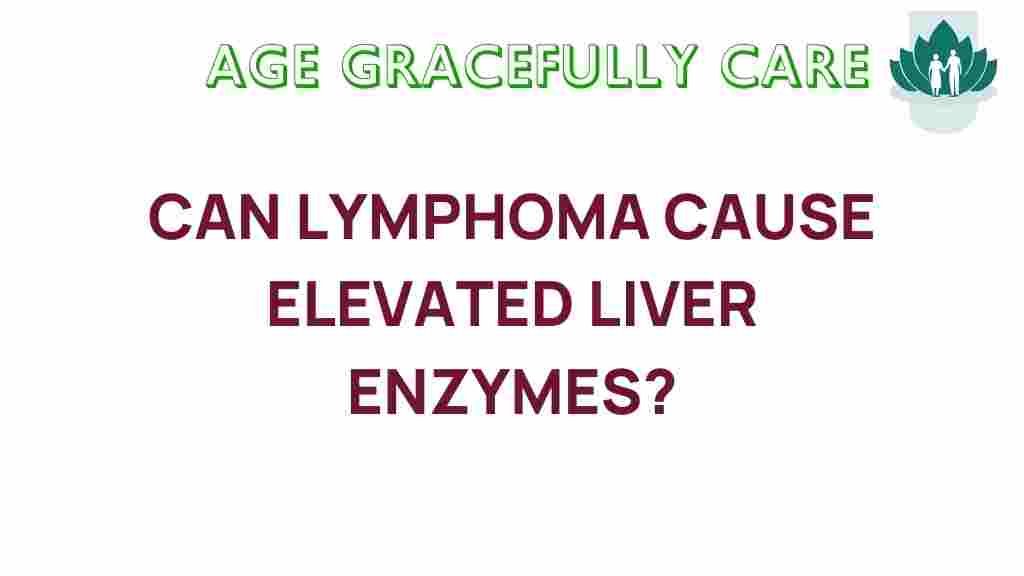Unraveling the Connection: Can Lymphoma Elevate Liver Enzymes?
Lymphoma is a type of cancer that affects the lymphatic system, which plays a crucial role in the body’s immune function. As a complex disease, lymphoma can have various effects on the body, including its potential impact on liver health. One of the critical areas of concern for individuals diagnosed with lymphoma is the elevation of liver enzymes. This article delves into the connection between lymphoma and elevated liver enzymes, exploring symptoms, diagnosis, treatment, and the latest medical research.
Understanding Lymphoma and Liver Enzymes
Liver enzymes are proteins produced by the liver that facilitate various biochemical reactions in the body. When liver cells are damaged or inflamed, these enzymes can leak into the bloodstream, resulting in elevated liver function tests. Common liver enzymes include:
- Alanine Aminotransferase (ALT): Primarily found in the liver, elevated levels can indicate liver damage.
- Aspartate Aminotransferase (AST): Present in various tissues, including the liver, heart, and muscles. Elevated AST may suggest liver or muscle damage.
- Alkaline Phosphatase (ALP): Elevated levels can indicate issues with the liver or bile ducts.
Individuals with lymphoma may experience elevated liver enzymes due to several factors, including direct liver involvement by the lymphoma, the effects of cancer treatments, or associated conditions such as infections.
How Lymphoma Affects Liver Function
The connection between lymphoma and liver enzymes can be attributed to several mechanisms:
- Direct Infiltration: In some cases, lymphoma can infiltrate the liver tissue, leading to inflammation and damage, which can elevate liver enzymes.
- Side Effects of Treatment: Treatments such as chemotherapy and radiation can affect liver function, resulting in elevated enzyme levels.
- Coexisting Conditions: Lymphoma patients are at risk for infections and other conditions that can lead to liver problems, thereby increasing liver enzymes.
Symptoms of Elevated Liver Enzymes in Lymphoma Patients
Recognizing the symptoms associated with elevated liver enzymes is crucial for timely diagnosis and treatment. Common symptoms may include:
- Fatigue: Persistent tiredness can indicate liver dysfunction.
- Jaundice: Yellowing of the skin and eyes can occur due to liver problems.
- Abdominal Pain: Discomfort or pain in the upper right abdomen may signal liver issues.
- Nausea and Vomiting: These symptoms can also be related to liver dysfunction.
- Dark Urine and Pale Stools: Changes in urine and stool color can indicate liver problems.
Diagnosing Elevated Liver Enzymes in Lymphoma Patients
Diagnosing elevated liver enzymes involves a combination of medical history, physical examination, and laboratory testing. Key steps include:
- Medical History: The healthcare provider will review the patient’s history of lymphoma and any symptoms they are experiencing.
- Physical Examination: A thorough examination will help identify any signs of liver dysfunction.
- Blood Tests: Liver function tests will measure the levels of liver enzymes and other indicators of liver health.
- Imaging Studies: Techniques such as ultrasound, CT scans, or MRIs may be used to evaluate liver structure and function.
- Liver Biopsy: In certain cases, a biopsy may be performed to assess the extent of liver involvement by lymphoma.
Treatment Options for Lymphoma and Elevated Liver Enzymes
Treatment for lymphoma may vary based on the type and stage of the cancer, as well as the patient’s overall health. When elevated liver enzymes are observed, treatment plans may include:
- Chemotherapy: This is a common treatment for lymphoma and may help reduce the tumor burden affecting the liver.
- Radiation Therapy: Targeted radiation may be used for localized lymphoma affecting the liver.
- Supportive Care: Managing symptoms and maintaining liver health through diet, hydration, and medications is essential.
- Experimental Treatments: Participation in clinical trials may provide access to new therapies aimed at lymphoma and liver health.
Recent Medical Research on Lymphoma and Liver Enzymes
Ongoing medical research continues to explore the intricate relationship between lymphoma and liver health. Studies have shown that:
- Patients with lymphoma often exhibit varying degrees of liver enzyme elevation, which can serve as a prognostic indicator.
- New therapies are being developed that specifically target lymphoma-related liver complications.
- Understanding the mechanisms behind liver enzyme elevation in lymphoma can lead to better management strategies and improved patient outcomes.
For further insights into the latest research, visit PubMed for peer-reviewed articles and studies.
Troubleshooting Elevated Liver Enzymes
If you or a loved one is experiencing elevated liver enzymes during lymphoma treatment, consider the following troubleshooting tips:
- Regular Monitoring: Keep track of liver function tests as part of routine care.
- Consult Your Healthcare Provider: Discuss any new symptoms or changes in health with your doctor promptly.
- Maintain a Healthy Diet: Focus on a balanced diet rich in fruits, vegetables, lean proteins, and whole grains to support liver health.
- Avoid Alcohol: Alcohol can exacerbate liver issues, especially during cancer treatment.
- Stay Hydrated: Proper hydration is crucial for overall health and liver function.
Conclusion
The connection between lymphoma and elevated liver enzymes is a critical area of concern for patients and healthcare providers alike. Understanding the potential implications of elevated liver enzymes can facilitate timely diagnosis and effective treatment, ultimately improving patient outcomes. With ongoing medical research and advancements in treatment options, individuals diagnosed with lymphoma can navigate their health journey with greater knowledge and support.
For more information on health and cancer-related topics, feel free to explore our health resources.
This article is in the category Health and created by AgeGracefullyCare Team
